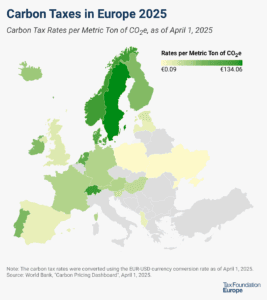
Note: The following is the testimony of Sean Bray, Director of European Policy at the Tax Foundation, prepared for a European Parliament Subcommittee on Tax Matters meeting of experts on May 23, 2023, titled, “Further Reform of Corporate Taxation Rules.”
Rapporteur Benjumea and distinguished members of the FISC Committee, thank you for the opportunity to provide testimony on the further reform of corporate taxation rules. I am Sean Bray, Director of European Policy at the TaxA tax is a mandatory payment or charge collected by local, state, and national governments from individuals or businesses to cover the costs of general government services, goods, and activities. Foundation.
I am going to cover three topics in my testimony today. First, I’ll share my views on the different incentives policymakers face when designing tax policy. Second, I will explain why the EU’s newly adopted minimum tax directive, otherwise known as Pillar Two, will not stop tax competition but simply change its nature. Finally, I will describe why policymakers should strongly consider a pro-growth tax policy called full expensing in future corporate tax reforms to accelerate investment and economic growth.
Since the Empty Chair Crisis of 1965, the EU has been built on consensus. Historically, this has been done through unanimous voting in the Council or the ordinary legislative procedure with the European Parliament. While there are trade-offs to both voting procedures, the process that is used to vote on tax policy reforms is a political question for elected leaders to decide.
However, European tax policy faces a different kind of consensus crisis: determining its main objective.
Is the goal to efficiently raise government revenue or to change social behavior through economic incentives? Is tax policy just another tool the European Commission can use in its geopolitical competition with the United States and China?
Different actors in the EU policymaking process have different, and sometimes contradictory, incentives when designing tax policy. There are equity considerations between Member States, sovereignty trade-offs when deciding the role of the EU, competition concerns when coordinating European tax policy with third-country policies, and political decisions when balancing the power of different EU institutions in policy design. Without a clear objective, European tax policy resembles a child’s piñata getting hit back and forth between partisan revenue grabs, reactionary proposals to tax incentives in foreign countries, and the trendy political topics of the day.
Before any further reform of corporate taxation rules takes place, policymakers should decide what the main goal of tax policy is and work across ideological, national, and institutional lines to build consensus. The EU’s credibility, domestically and geopolitically, relies on it.
In my view, principled tax policy’s primary purpose should be to sufficiently raise revenue for government spending priorities as economically efficiently as possible. This allows the government to spend money on social priorities while enabling the market to drive economic growth. I believe this is entirely consistent with Europe’s social-market economic model.
However, to do so, tax policy cannot stand in the way of success. According to economists at the Organisation for Economic Co-operation and Development (OECD), corporate income taxes are the most harmful for long-term economic growth.[1] This is primarily because financial capital is the most mobile and therefore most sensitive to changes in tax policy. This is not to imply (as others have) that every company that moves capital to different countries is doing so for nefarious purposes. Capital mobility is one of the EU’s four freedoms and a productive feature of the international economic system.
Corporate tax revenue is also generally less stable than consumption taxA consumption tax is typically levied on the purchase of goods or services and is paid directly or indirectly by the consumer in the form of retail sales taxes, excise taxes, tariffs, value-added taxes (VAT), or an income tax where all savings is tax-deductible. revenue.[2] Therefore, an overreliance on corporate revenue can leave governments exposed to unexpected budgetary deficits according to the business cycle.
Despite the implementation of Pillar Two, tax rate competition will remain an important feature of EU tax policy. The tax incidenceTax incidence is a measure of who bears the legal or economic burden of a tax. Legal incidence identifies who is responsible for paying a tax while economic incidence identifies who bears the cost of tax—in the form of higher prices for consumers, lower wages for workers, or lower returns for shareholders. of corporate income taxes falls on workers in the form of lower wages, shareholders through lower dividends, or consumers through higher prices. Therefore, a higher corporate income taxA corporate income tax (CIT) is levied by federal and state governments on business profits. Many companies are not subject to the CIT because they are taxed as pass-through businesses, with income reportable under the individual income tax. rate makes an economy less competitive for highly mobile private investment, reduces government revenue, and hampers growth.[3]
In addition, tax base competition will become that much more important to business decisions because, simply put, countries will not stop competing for investment. It will just take a different form. This type of competition puts Member States with less fiscal capacity at a disadvantage and will create more economic distortions due to subsidy wars between Member States within the EU and with countries outside of the EU.
As policymakers shift their focus away from tax rates and look to harmonize the EU’s corporate tax baseThe tax base is the total amount of income, property, assets, consumption, transactions, or other economic activity subject to taxation by a tax authority. A narrow tax base is non-neutral and inefficient. A broad tax base reduces tax administration costs and allows more revenue to be raised at lower rates. , they should understand the benefits of full expensingFull expensing allows businesses to immediately deduct the full cost of certain investments in new or improved technology, equipment, or buildings. It alleviates a bias in the tax code and incentivizes companies to invest more, which, in the long run, raises worker productivity, boosts wages, and creates more jobs. .
Full expensing allows businesses to immediately deduct the full cost of certain investments in new or improved technology, equipment, or buildings.[4] It alleviates a bias in the tax code and incentivizes companies to invest more, which, in the long run, raises worker productivity, boosts wages, and creates more jobs.[5] In addition, making full expensing permanent rather than temporary smooths out the business cycle, ensures confidence in long-term investment planning, and results in higher levels of investment.[6]
A case study on the power of full expensing can be found in our report on tax policy and the EU’s green transition.[7]
Imagine that, in line with the objectives of the green transition, a delivery business wants to update its fleet of company vehicles from combustion engine cars to electric vehicles at a total cost of €1 million. If this investment were to take place in Spain under its special accelerated depreciation schedule for greener vehicles, the firm would only benefit from a net present value of 92.7 percent of the investment cost.
In Greece, the percentage of capital cost recovery for this same investment would be subjected to what classification of emissions the new vehicles would release into the air. If the vehicle fell under the “low emission” category, meaning emissions up to 50g CO2/km, the firm would be able to recover 90.1 percent of the initial investment cost. On the other hand, if the vehicle was considered “zero emissions,” then the firm could recover 96.5 percent.
If the firm made a €1 million investment in Estonia or Latvia, however, it could recover the entire €1 million investment. This is because Estonia and Latvia both operate cash-flow tax systems. In essence, this means that both countries have permanent full expensing for all business expenditures, not just those related to the green transition.
Tax base harmonization in the EU should not be done simply for the sake of harmonization. What’s at stake is harmonizing with the wrong policy. If harmonization proceeds, it should be done with the role of business investment and future growth in mind.
[1] Laura Vartia, “How do Taxes Affect Investment and Productivity?: An Industry-Level Analysis of OECD Countries,” OECD Economics Department Working Papers 656 (Dec. 19, 2008), https://doi.org/10.1787/230022721067.
[2] Ibid.
[3] Steve Entin, “Labor Bears Much of the Cost of the Corporate Tax,” Tax Foundation, Oct. 24, 2017, https://taxfoundation.org/labor-bears-corporate-tax/.
[4] Tax Foundation, “Full Expensing,” https://taxfoundation.org/tax-basics/full-expensing/.
[5] Kevin A. Hassett and R. Glenn Hubbard, “Tax Policy and Business Investment,” Handbook of Public Economics 3 (2002), https://www.sciencedirect.com/science/article/pii/S1573442002800246.
[6] Giorgia Maffini, Jing Xing, and Michael P. Devereux, “The Impact of Investment Incentives: Evidence from UK Corporation Tax Returns,” American Economic Journal: Economic Policy 11:3 (August 2019): 361-89, https://www.aeaweb.org/articles?id=10.1257/pol.20170254.
[7] Sean Bray, Daniel Bunn, and Joost Haddinga, “The Role of Pro-Growth Tax Policy and Private Investment in the European Union’s Green Transition,” Tax Foundation, May. 4, 2023, https://taxfoundation.org/eu-green-transition-tax-policy.





